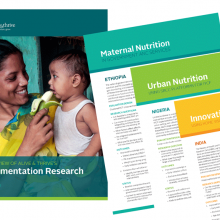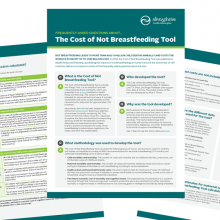Journal article
Feb 16 2021

Factor Structure and Equivalence of Maternal Resources for Care in Bangladesh, Vietnam, and Ethiopia (Basnet, S., 2020. Maternal & Child Nutrition)
Maternal resources for care in Bangladesh, Viet Nam, and Ethiopia were revealed to be structurally similar and measurement equivalent.
Journal article
Dec 08 2020

Can complex programs be sustained? A mixed methods sustainability evaluation of a national infant and young child feeding program in Bangladesh and Vietnam (Moucheraud, C., 2020. BMC Public Health)
This study evaluates the sustainability of activities introduced during A&T implementation (2009–2014) in Bangladesh and Vietnam, revealing that multiple activities, such as mass media campaigns, policy and advocacy activities, and social mobilization activities were integral to the program’s
Journal article
Dec 08 2020

Mistakes from the HIV pandemic should inform the COVID-19 response for maternal and newborn care (Gribble, K., 2020. International Breastfeeding Journal)
During the COVID-19 pandemic, policy makers and practitioners must learn from mistakes made during the HIV pandemic, when breastfeeding was undermined through isolating infants from their mothers, and formula feeding resulted in more infant deaths than the disease.
Brief, Handout
Oct 28 2020

An overview of Alive & Thrive's implementation research
Alive & Thrive's implementation research spans its program areas, seeking to answer "how" to implement effective interventions and policies. Active studies are detailed in the attached documents.
Handout
Oct 14 2020

Frequently Asked Questions about the Cost of Not Breastfeeding tool
Not breastfeeding leads to more than half a million child deaths annually and costs the world economy up to US$1 billion a day.
Journal article
Jul 16 2020

Associations of maternal resources with care behaviours differ by resource and behaviour (Basnet, S., 2020. Maternal & Child Nutrition)
This study examines how maternal resources for care, including maternal education, knowledge, height, nourishment, mental well-being, decision-making autonomy, employment, support in chores, and perceived instrumental support, are associated with care behaviors, such as IYCF, hygiene, health-seek

